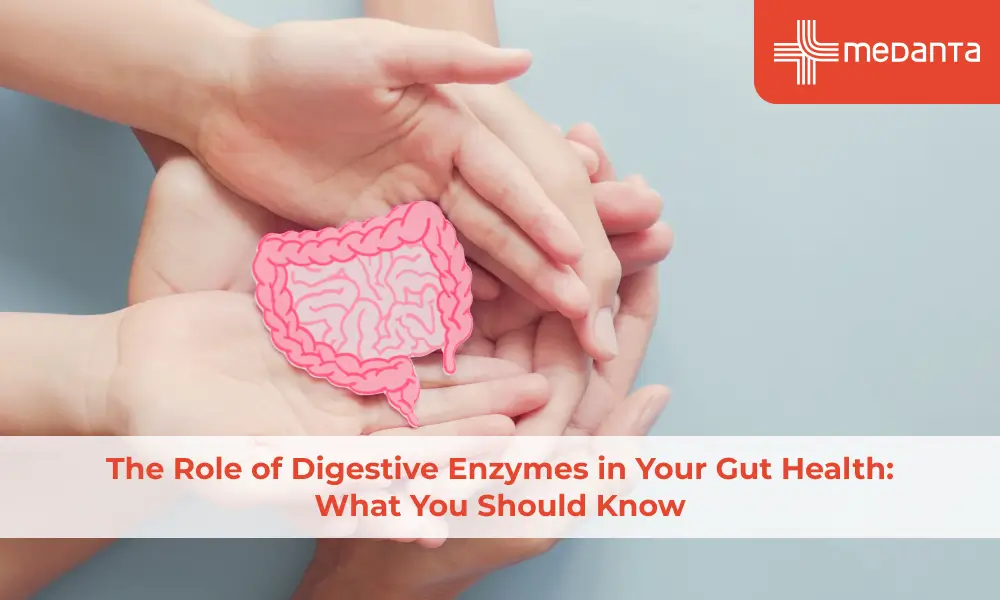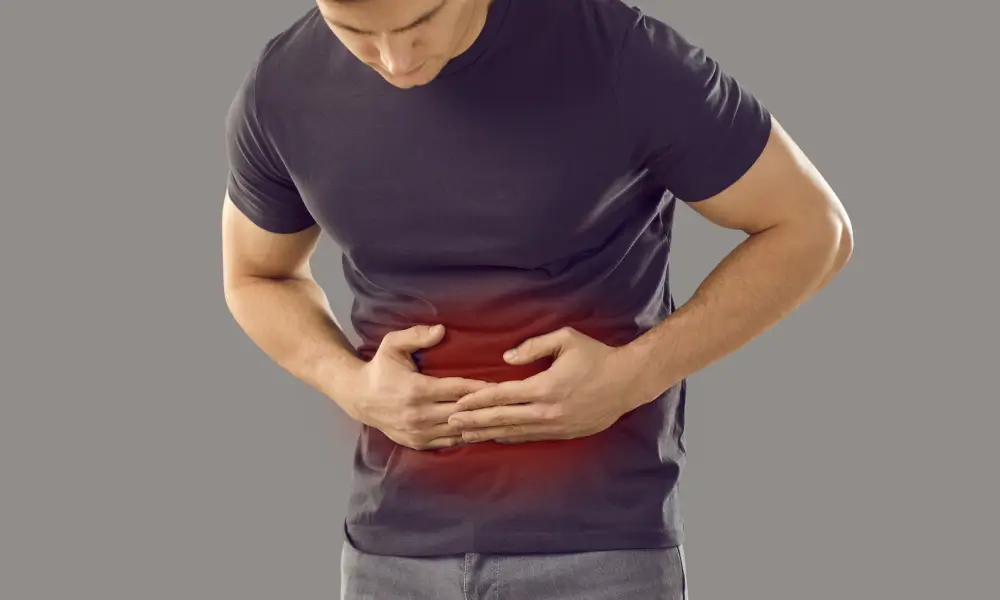The Role of Digestive Enzymes in Your Gut Health: What You Should Know

TABLE OF CONTENTS
People have started taking digestive enzyme supplements more often to treat common gut issues, heartburn and other digestive problems. These vital proteins do much more than what supplements offer. They work non-stop in the digestive system to break down food and help the body absorb key nutrients.
The digestive tract contains these specialised proteins in multiple places - the mouth, stomach and small intestine. They perform an essential task of breaking large molecules like fats, proteins and carbohydrates into smaller pieces that the body easily absorbs. The pancreas serves as the body's enzyme powerhouse. It makes the most important digestive enzymes that break down these major food components.
The body's inability to make enough digestive enzymes can disrupt normal digestion by a lot. This condition stops proper nutrient absorption and might lead to digestive disorders of various types, including lactose intolerance. Common signs of this deficiency show up as belly pain, bloating, diarrhoea, gas, oily stools and unexplained weight loss.
What are Digestive Enzymes & How Do They Work?
Digestive enzymes are specialised proteins that catalyse biological reactions in your body. These proteins speed up chemical reactions that turn your food into absorbable nutrients. Your body needs these proteins to prevent nutrients from going to waste.
Your digestive process starts when salivary amylase breaks down carbohydrates in your mouth. Ptyalin, a specific enzyme, begins starch digestion during chewing. Food continues its chemical breakdown as it moves through your digestive system.
Your body's enzyme production happens in several key areas:
Mouth: Salivary glands release amylase to begin carbohydrate digestion
Stomach: Chief cells secrete pepsinogen that becomes active pepsin to break down proteins
Pancreas: The true enzyme powerhouse produces amylase, lipase and protease
Small intestine: Surface cells produce additional enzymes
Your pancreas plays a crucial role by producing most of the important enzymes. These pancreatic enzymes work best in the small intestine's simple environment, where pH levels range from 6 to 7.
Different enzymes target specific nutrients. Amylase converts complex carbohydrates into simple sugars. Protease focuses on proteins and turns them into amino acids. Lipase handles fats and transforms them into fatty acids and glycerol that your body absorbs.
Your small intestine's specialised enzymes include lactase for milk sugar, sucrase for table sugar, and maltase for malt sugar. These enzymes break down complex sugars into simpler forms that your body uses for energy.
This fascinating process allows digestive enzymes to turn your meals into essential building blocks that your body needs for energy, cell repair, and overall function.
Types of Digestive Enzymes & Their Specific Roles
Your body needs three main types of digestive enzymes to break down food into nutrients it can absorb. These enzymes work like specialised tools in a well-laid-out workshop, each targeting specific food components.
Amylases break down carbohydrates throughout your digestive experience. The process starts in your mouth with salivary amylase (also called ptyalin) breaking down starches. Your small intestine then uses pancreatic amylase to continue this work and convert complex carbohydrates into simpler sugars like maltose.
Your small intestine uses these specialised enzymes:
Maltase turns maltose into glucose
Sucrase breaks down table sugar (sucrose) into glucose and fructose
Lactase splits milk sugar (lactose) into glucose and galactose
Proteases work only on proteins. Your stomach starts the process with pepsin - which breaks proteins into smaller peptides. These peptides move to your small intestine, where pancreatic proteases—including trypsin, chymotrypsin, and elastase—break them down further. The final step involves carboxypeptidase, dipeptidase, and aminopeptidase enzymes. These convert peptides into individual amino acids your body can absorb.
Lipases break down fats efficiently. While lipase production begins in your mouth and stomach, pancreatic lipase does most of the fat digestion in your small intestine. These enzymes break triglycerides (fats) into fatty acids and glycerol. Your liver's bile salts help by making fat droplets more available to lipase enzymes.
These enzymes do more than just digest food. Your liver's hepatic lipase processes cholesterol-carrying particles. Hormone-sensitive lipase releases stored energy from fat cells during exercise or stress. These digestive enzymes help extract nutrients from food and support energy management throughout your body.
Learning about these enzyme functions helps explain why certain dietary problems occur and shows how better enzyme production might improve gut comfort.

When Your Body Lacks Enzymes: Causes of Low Enzyme Levels
Your digestive problems might stem from enzyme deficiencies, yet most people don't realise this connection. The body fails to break down food and absorb nutrients when it doesn't produce enough digestive enzymes.
Health conditions can trigger this deficiency. Adults most commonly develop it from chronic pancreatitis. Scarring and pancreatic cysts block enzymes from flowing normally in this long-term inflammatory condition. Other conditions like acute pancreatitis, pancreatic cancer, and cystic fibrosis also disrupt how enzymes are made.
Genes play a most important role in some deficiencies. Lactose intolerance happens because the body doesn't make enough lactase, which makes dairy hard to digest.
People with Congenital Sucrase-Isomaltase Deficiency (CSID) can't break down certain sugars properly.
Cystic fibrosis is the leading cause of enzyme deficiency in children.
The pancreas makes fewer digestive enzymes as we age. Heavy drinking, smoking, and ongoing stress can also reduce enzyme production.
Symptoms
Your body shows these signs of enzyme deficiency:
Bloating and excessive gas
Stomach pain and cramping
Diarrhoea or constipation
Fatty, foul-smelling stools that float (steatorrhoea)
Unexplained weight loss
Abdominal distension
These deficiencies can cause serious problems if ignored. The body can't absorb vitamins A, D, E, and K without proper fat breakdown. This lack of nutrition might demonstrate itself through dry skin, brittle nails, hair loss, depression, fatigue, muscle loss, and frequent infections.
Management
Taking good care of your digestive system helps boost your enzyme production. A few simple lifestyle changes can make a huge difference:
Eat slowly and chew your food well
Cut back on alcohol
Keep your stress levels in check
Stay active regularly
People often ask if enzyme supplements can help their digestive issues. These supplements work well for people with diagnosed deficiencies, but they may not benefit everyone. You should talk to your doctor before you start taking any supplements.
Conclusion
Digestive enzymes play a key role in your gut health and overall well-being. These powerful proteins break down complex food molecules into nutrients your body can use. A healthy diet won't nourish you properly without them.
Your body's enzyme function explains many digestive problems people face. Different enzymes handle specific food components - amylases work on carbohydrates, proteases tackle proteins, and lipases break down fats. Each enzyme has its own job in the complex process of digestion.
Your natural enzyme production depends on your age, genetics, and health conditions. Warning signs like bloating, stomach pain, and fatty stools often point to enzyme deficiencies. Quick action on these symptoms helps prevent future complications.
Your gut health impacts almost every part of your well-being - from how you absorb nutrients to your immune system's strength. A complete health strategy should include keeping your digestive enzyme levels healthy.
FAQs
Where are digestive enzymes produced in the body?
Digestive enzymes are produced in several places throughout the digestive system. The mouth, stomach, pancreas, and small intestine all contribute to enzyme production, with the pancreas being the primary source of the most important digestive enzymes.
What are the primary types of digestive enzymes?
The the following are the main types of digestive enzymes are:
Amylases (which break down carbohydrates)
Proteases (which process proteins)
Lipases (which digest fats) Each type targets specific food components to aid in digestion.
How do I know if I have a digestive enzyme deficiency?
Common symptoms of enzyme deficiency include bloating, stomach pain, diarrhoea or constipation, fatty stools, and unexplained weight loss. If you experience these symptoms regularly, it's best to ask a doctor for a proper diagnosis.
Are digestive enzyme supplements suitable for everyone?
Digestive enzyme supplements are primarily designed for people with diagnosed enzyme deficiencies. While there's some early research suggesting potential benefits for other conditions, it's essential to consult a doctor before starting any supplement regimen, as unnecessary supplementation might interfere with your body's natural enzyme production.






